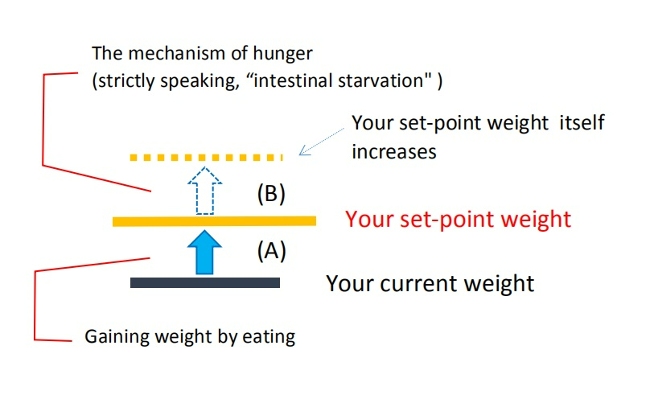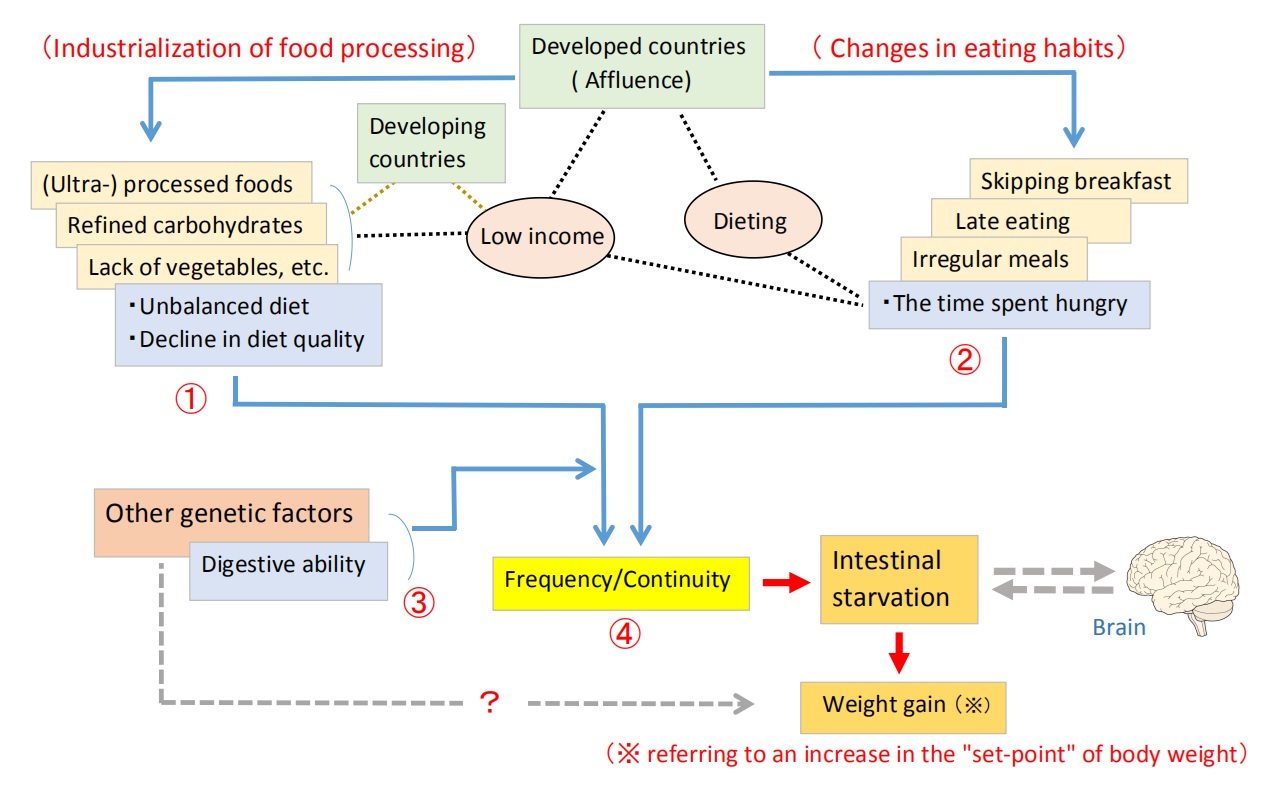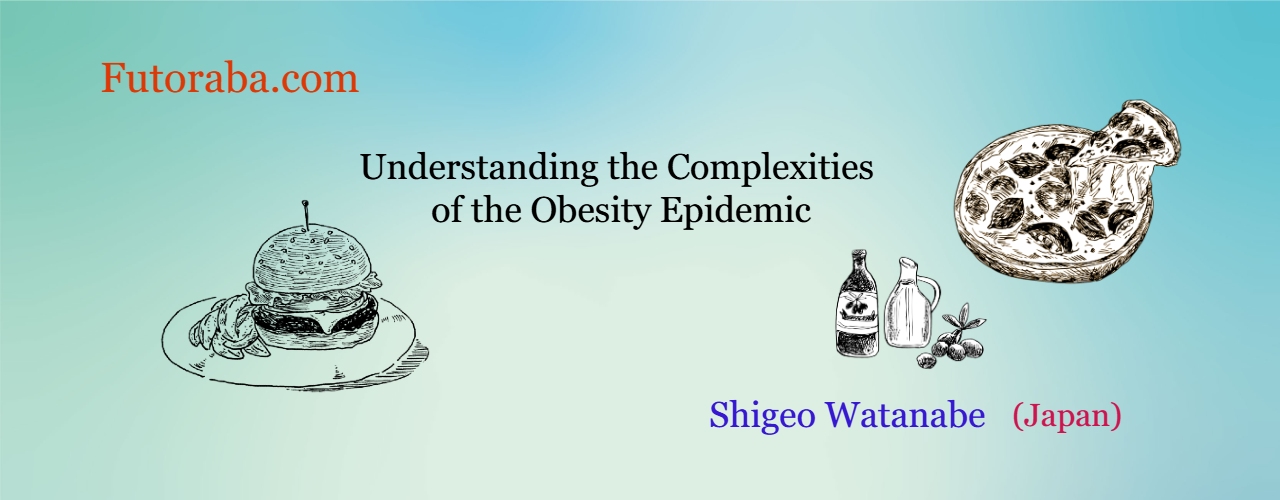1. Calorie counting is OK, but not very useful
This blog is based on my experience and by and large, aligns with the "set-point" theory of body weight.
In both lean and overweight individuals, body weight tends to remain relatively stable. Most obese people who attempt calorie-restricted diets eventually regain the weight they lost, returning to their original weight[1].
Thus, weight fluctuations due to temporary caloric restriction and its subsequent removal can basically be represented within the range shown as [A] in Figure-1. However, I believe the fundamental issue of obesity lies in the set-point itself being higher than normal.
The Increasingly Important "Set-Point" Theory of Body Weight

(Figure-1)
In other words, the term "gaining weight" has two distinct meanings.
One refers to gaining weight from overeating (Figure-1, A), while the other refers to an increase in the set-point weight itself (Figure-1, B).
The confusion between these two concepts adds to the complexity of the obesity issue.
Two Meanings to the Phrase "Gaining Weight"
2. "Intestinal starvation" as a form of hunger inside the gut,
more common in modern times
I believe that an increase in the body’s set-point weight is triggered by biological adaptive responses that occur when the body perceives itself to be in a state of starvation.
There are two ways in which the body can come to sense such starvation: one is excessive caloric restriction that leads to an energy deficit, and the other is what I call “intestinal starvation,” which I explain below.
“Intestinal starvation” does not necessarily mean an “energy crisis” or “food shortage.”
It refers to a state in which, through repeated cycles of eating and being hungry, all ingested food is fully digested throughout the entire intestines (or it might be the small intestine only). In this state, I believe that a signal of “no food” is transmitted to the brain via the gut–brain axis.
This can be called a modern form of hunger that can occur even under normal living conditions in relatively affluent countries where large amounts of easily digestible refined carbohydrates and (ultra-)processed foods are consumed.
My Definition of “Intestinal Starvation”
In my opinion, at least four factors are necessary for intestinal starvation to be induced (Figure-2, ①-④). Since it can occur independent of caloric intake and without a person realizing it, it may explain why obesity is considered a multifactorial and chronic disease. (In this context, intestinal starvation can be considered as a "confounding factor.")
Three (+one) Factors to Accelerate “Intestinal Starvation”
Figure-2: Intestinal starvation and four related factors

(Note: Even if a person eats a large amount, intestinal starvation can be induced if their diet is leaning toward refined carbohydrates, some protein, and ultra-processed foods, etc. and they experience prolonged hunger due to eating habits such as eating only two meals a day.)
3. Easily digestible foods (refined carbs, ultra-processed foods, etc.) contribute to weight gain
It is not an overstatement to say that the sharp rise in being overweight and obese coincided with the rapid industrialization of food processing, particularly refined grains and ultra-processed foods, in the 1970’s and 80’s.
In traditional diets around the world, even if people spent an entire day without eating, indigestible fiber and other undigested materials would remain in the intestines. However, many people today prefer soft, easy-to-eat foods that require little chewing, leading to a diet overly reliant on refined carbohydrates, easily digestible proteins, and ultra-processed foods like fast food and instant foods.
Why Does the Body Perceive That It Is More Starved than in the Past?
The Rise in Obesity is Closely Linked to the Consumption of Ultra-Processed Foods
Other Recommended Articles
4. Objective
My main purpose for running this website is to let many people worldwide know my thoughts, but I don't want to eventually stop with just an "interesting idea." Ultimately, I’m hoping to somehow prove that "intestinal starvation makes people gain weight."
June 2023: I have begun to send out offers to obesity research institutes and universities around the world, including Japan.
5. Why me?
Maybe I should just leave this to the doctors and researchers. But I felt strongly that I had to write about this because I knew I was the only one that could write about this theory.
In fact, I used to lose confidence, but then I came across a book "Why We Get Fat" by Gary Taubes and it gave me courage.
"The history of science suggests another interpretation: if people have been thinking about this idea for more than a century and trying to test it for decades and they still can't generate compelling evidence that it's true, it's probably not. We can't say it's not with absolute certainty, because science doesn't work that way. But we can say that there's now an exceedingly good chance it's simply wrong, one of the many seemingly reasonable ideas in the history of science that never panned out. And if reducing calories-in doesn't make us lose weight, and if increasing calories-out doesn't even prevent us from gaining it, maybe we should rethink the whole thing and find out what does."
( Gary Taubes. 2010. Why We Get Fat. Page 56.)
<References>
[1] Methods for voluntary weight loss and control. NIH Technology Assessment Conference Panel. Ann Intern Med. 1992 Jun 1;116(11):942-9.





